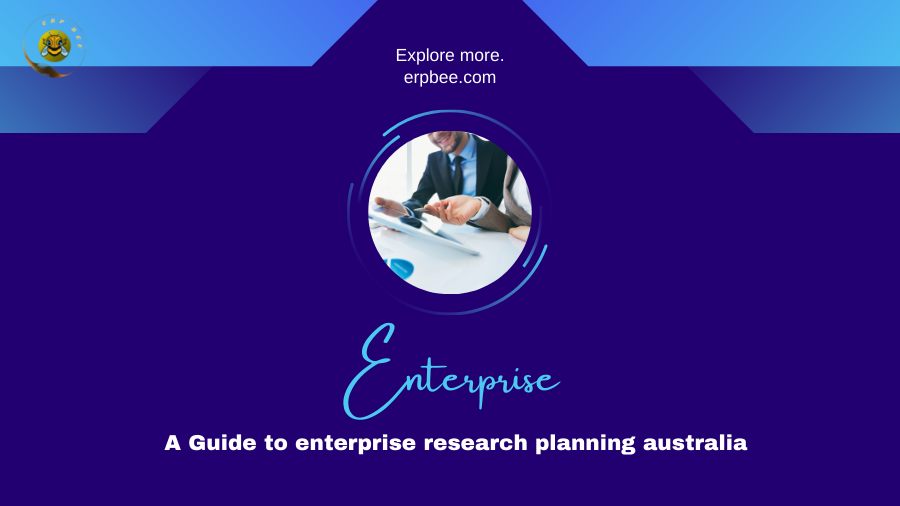In today's dynamic Australian business landscape, staying ahead of the curve requires a strategic approach to research. Gone are the days of siloed information gathering and reactive decision-making. For enterprises of all sizes, Enterprise Research Planning (ERP) has emerged as a critical tool to navigate the complexities of market research and competitive intelligence. This comprehensive guide delves into the world of enterprise research planning Australia, equipping you with the knowledge and strategies to optimize your research efforts and gain a significant edge.
What is Enterprise Research Planning?
ERP is a systematic approach to identifying, collecting, analyzing, and disseminating research insights across an organization. It involves establishing a centralized framework for research activities, fostering collaboration between departments, and ensuring data-driven decision-making.
Key benefits of enterprise research planning australia:
- Enhanced decision-making: ERP provides a clear and unified view of market trends, customer behavior, and competitor activity. This empowers businesses to make informed decisions based on reliable data.
- Improved efficiency: Streamlined research processes and centralized knowledge repositories minimize duplication of effort and optimize resource allocation.
- Increased ROI: Strategic research leads to targeted marketing campaigns, product development initiatives, and improved customer service – all contributing to a strong return on investment.
- Reduced risk: Proactive research helps identify potential threats and opportunities, allowing businesses to mitigate risks and capitalize on market shifts.
- Competitive advantage: A well-defined ERP strategy fosters innovation and agility, enabling businesses to stay ahead of the competition in the ever-evolving Australian market.
Building an Effective ERP Strategy in Australia
1. Define your research objectives:
- What are your key business goals?
- What specific information do you need to achieve them?
A clear understanding of your objectives will guide your research focus and ensure you collect the most relevant data.
2. Identify stakeholders:
- Who needs access to research findings within your organization?
- How can you ensure their input and collaboration are factored into the research process?
Involving key stakeholders from marketing, sales, product development, and other departments fosters a culture of research-driven decision making.
3. Choose the right research methods:
Australia offers a diverse range of research methodologies, from traditional surveys and focus groups to advanced online data analytics and social media listening tools. Select the methods that best suit your specific research objectives and target audience.
4. Leverage Australian market research resources:
- Numerous Australian organizations specialize in market research and competitive intelligence. Partnering with them can provide valuable expertise and access to specialized data sets.
- Industry associations, government agencies, and academic institutions can also be valuable sources of research insights specific to the Australian market.
5. Invest in research technology:
Several software solutions cater to the needs of enterprise research teams in Australia. These tools can streamline data collection, analysis, and reporting, facilitating collaboration and knowledge sharing.
6. Develop a culture of research:
- Embed a research-centric mindset within your organization by encouraging employees to actively seek and utilize research findings in their roles.
- Consider offering training programs to equip your team with the necessary skills to access, analyze, and interpret research data effectively.
7. Continuous improvement:
The Australian market is constantly evolving. Regularly evaluate the effectiveness of your ERP strategy and adapt it as needed to ensure it remains aligned with your business goals and market dynamics.
Conclusion
Enterprise Research Planning is a powerful tool for any Australian business seeking to thrive in today's competitive landscape. By implementing a well-defined ERP strategy, you can gain a deeper understanding of your market, customers, and competitors, ultimately driving sustainable growth and success.
Additional considerations for Australian businesses:
- Data privacy regulations: Ensure your research practices comply with Australia's strict data privacy laws, such as the Privacy Act 1988.
- Cultural nuances: Australia's diverse multicultural landscape necessitates a research approach that accounts for cultural sensitivities and variations in consumer behavior across different demographics.
- Emerging technologies: As technology continues to evolve, stay informed about new research methods and tools that can further enhance your ERP strategy.
By embracing a strategic approach to research, Australian enterprises can unlock the full potential of their data, gain a competitive edge, and achieve sustainable success in the dynamic Australian market.
YOU MAY BE INTERESTED IN:
From Concept to Creation: UX, PM, and Dev’s Role in User-Friendly UIs
Enterprise Automation with SAP Build Process Automation and Automation Anywhere
SAP Builders Spotlight: Photo sharing, AI & creative community with Toast Photography
A Comprehensive Guide to SAP MM Module Certification
New Education Policy 2024: A Comprehensive Guide for Students, Parents, and Educators
